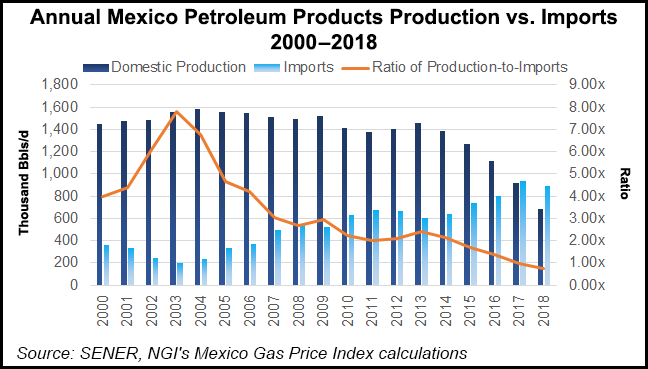Regulatory | NGI All News Access
Former Mexican Presidents Blast Current Crop of Energy Officials After Summit Cancelation
The last-minute cancellation by Mexico’s government of an international energy forum this week has revealed a deep schism among senior politicians over the current administration’s policies on the sector.

Two former Mexican presidents made outspoken angry responses to the decision. Late Friday, the Energy Ministry (Sener) announced that the secretary, RocÃo Nahle, decided to cancel the ministry’s participation in a “summit” of the Mexico-Germany Energy Alliance programmed for Tuesday (March 19) at the CitiBanamex center in Mexico City. CitiBanamex is the Mexican unit of Citigroup Inc.
The alliance announced the cancellation in its Twitter account without further explanation, but the usually well informed EnergÃa a Debate website said it had been told by sources that the issues being debated at the event “don’t respond to current reality and favor the energy reform of the last administration.” The reform was enacted in 2013 under the 2012-2018 government of President Enrique Peña Nieto.
Following a landslide election victory, President Andrés Manuel López Obrador was inaugurated as president on Dec. 1 of last year, and has since steered the nation’s energy policy in a direction that is critical of the reform.
Vicente Fox (2000-2006), who when he was elected became the first Mexican president from an opposition party to win a general election since 1910, launched a fierce attack on Nahle for having ditched Tuesday’s event.
“What kind of signals are we giving in terms of international cooperation?” asked Fox on his Twitter account. “It’s obvious that Energy Secretary RocÃo Nahle can’t cope. She doesn’t have the ability required for her job and she does everything at the last minute. What a mediocre bunch,” exclaimed Fox in the gruff, outspoken language for which he is known and was the hallmark of his election victory in 2000.
Nahle shied from rising to Fox’s bait, though she tweeted: “Right now we’re undertaking the rescue of the sector that you destroyed and corrupted, leaving it in hands of incapable people who squandered the nation’s oil income. I’m a professional in the subject, and now the priority is to protect the nation’s interests. Our foreign relations are better than ever.”
Fox, a member of the Partido Acción Nacional (PAN), began his presidency promising a reform to abolish the state petroleum and power monopolies but lacked sufficient support in Congress to achieve the goal. His successor, Felipe Calderón, also of the PAN, had the same ambition during his 2006-2012 presidency. He proposed an energy reform that was debated for months in Congress. But the “reform” that he achieved was almost absent of significant content, save for the establishment of the National Hydrocarbons Commission (CNH) as the upstream regulator.
Calderón’s criticism of Nahle was only marginally milder than Fox’s. “The ineptitude of the energy sector officials is a real pity,” he tweeted. “This kind of decision not only reflects a lack of knowledge on the issues, they also cause severe damage to confidence in Mexico, along with consequences for investment and, hence, growth and jobs.”
López Obrador, who had opposed the energy reform, has strongly condemned the “neo-liberal” Mexican governments of recent years. Key figures of López Obrador’s cabinet — such as Nahle, Manuel Bartlett, the chief executive of the state power utility, Comisión Federal de Electricidad (CFE), and Octavio Romero Oropeza, head of the state oil company Petróleos Mexicanos (Pemex) — were also firm opponents of the reform.
However, the López Obrador government has made no move to reverse the reform and has given indications that it is likely to resume the upstream auctions launched by Peña Nieto by the middle of the six-year administration.
On Monday, on the day that commemorates the 1938 nationalization of the oil industry in Mexico, Nahle said four companies would be invited to take part in a restricted tender to build the Dos Bocas refinery, in Tabasco state. The refinery will be Mexico’s seventh and is seen by the government as a key part of weaning the country off of fuel imports.
© 2024 Natural Gas Intelligence. All rights reserved.
ISSN © 2577-9877 | ISSN © 2577-9966 |
